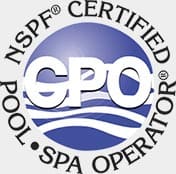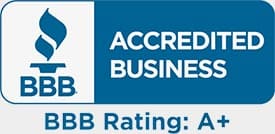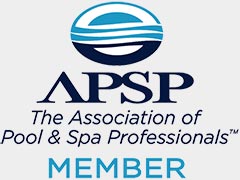
Every pool owner’s nightmare scenario involves an unexpected “Code Brown” situation that brings pool activities to an immediate halt. While discussing fecal incidents in swimming pools isn’t the most glamorous topic, it’s a reality that affects thousands of Atlanta pool owners annually. Whether it’s a toddler’s accident, pet mishap, or unfortunate adult incident, knowing how to respond quickly and effectively protects your family’s health while preserving your pool investment.
The Centers for Disease Control reports that fecal incidents occur in approximately 1 in 1,000 pool visits, making proper response protocols essential knowledge for every pool owner. At Andy’s Pool Service, we’ve helped Atlanta area families handle these challenging situations professionally and safely since 1987, ensuring pools return to safe swimming conditions as quickly as possible.
Understanding the Health Risks
- Pathogenic Bacteria Threats: Fecal matter contains numerous harmful bacteria including E. coli, Salmonella, and Shigella that can cause serious gastrointestinal illnesses when ingested through contaminated pool water.
- Parasitic Organisms: Cryptosporidium and Giardia parasites commonly found in fecal matter are particularly dangerous because they’re resistant to standard chlorine levels and can survive in properly treated pools for days.
- Viral Contamination: Norovirus, hepatitis A, and other viral pathogens can spread through fecal contamination, causing illness outbreaks that affect multiple swimmers and their families.
- Infection Timeline: Symptoms from waterborne illnesses typically appear 1-3 days after exposure, making immediate proper response crucial for preventing illness in swimmers who were present during the incident.
Immediate Response Protocol
- Clear the Pool Immediately: As soon as fecal matter is discovered, remove all swimmers from the pool and restrict access to the area. This prevents additional contamination and protects people from exposure to harmful pathogens.
- Do Not Attempt Removal While Swimming: Never try to remove fecal matter while people are still in the pool. The disturbance can spread contamination throughout the water, making the problem significantly worse.
- Document the Incident: Note the time of discovery, size and consistency of the fecal matter, and number of people who were swimming. This information helps determine appropriate treatment protocols.
- Gather Necessary Supplies: Collect pool skimmer nets, disposable gloves, plastic bags, and disinfectant before beginning cleanup procedures to ensure safe and effective contamination removal.
Safe Removal Procedures
- Personal Protection First: Wear disposable gloves and avoid direct contact with contaminated water or equipment during the removal process. Consider wearing old clothes that can be thoroughly washed or discarded.
- Formed vs. Diarrheal Matter: Solid, formed fecal matter poses less contamination risk than diarrheal incidents. Liquid matter spreads throughout the pool water, requiring more extensive treatment protocols.
- Skimmer Net Technique: Use a fine-mesh pool skimmer to carefully remove solid matter, working slowly to avoid breaking it apart and spreading contamination throughout the pool water.
- Equipment Disinfection: All equipment used in the removal process must be thoroughly disinfected with a strong chlorine solution before being returned to regular pool maintenance use.
Water Treatment Requirements
- Chlorine Shock Treatment: Raise free chlorine levels to 2 parts per million (ppm) for formed incidents or 20 ppm for diarrheal incidents, maintaining these levels for specific time periods based on contamination type.
- pH Adjustment: Ensure pH levels remain between 7.2-7.5 during disinfection to maximize chlorine effectiveness against harmful pathogens and bacteria.
- Filtration System Management: Run the pool filtration system continuously during treatment, backwashing or cleaning filters as needed to remove contaminated particles from the water.
- Water Circulation: Ensure proper water circulation reaches all areas of the pool, including steps, benches, and corners where contamination might accumulate.
CDC-Recommended Disinfection Times
- Formed Fecal Matter: Maintain 2 ppm free chlorine for 25 minutes at 77°F or 30 minutes at 68°F before allowing swimmers to return to the pool.
- Diarrheal Incidents: Require 20 ppm free chlorine for 12.75 hours at 77°F or 16 hours at 68°F due to the higher risk of Cryptosporidium and other resistant pathogens.
- Temperature Considerations: Lower water temperatures require longer disinfection times, making accurate temperature measurement crucial for determining safe swimming resumption.
- Testing Verification: Use reliable test strips or digital testing equipment to verify chlorine levels remain at required concentrations throughout the entire disinfection period.
Pool Closure and Communication
- Guest Notification: Inform all swimmers and guests about the incident and required pool closure, providing clear timelines for when swimming can safely resume.
- Social Responsibility: If the incident occurred during a gathering, consider notifying attendees about potential exposure so they can monitor for symptoms and seek medical attention if needed.
- Documentation for Health Departments: Severe incidents or those involving commercial pools may require notification to local health departments, particularly if multiple illnesses develop.
- Insurance Considerations: Document the incident and response procedures for potential insurance claims related to illness or pool damage from extensive chemical treatment.
Prevention Strategies for Atlanta Pools
- Bathroom Facility Access: Ensure easy access to bathroom facilities near pool areas, especially important during children’s parties and gatherings where accidents are more likely.
- Diaper Guidelines: Require swim diapers for all non-toilet-trained children, though these provide limited protection and frequent bathroom breaks remain essential.
- Pre-Swimming Hygiene: Encourage all swimmers to shower and use bathroom facilities before entering the pool to reduce contamination risk from all sources.
- Adult Supervision: Maintain adequate adult supervision of children to identify potential bathroom needs before accidents occur in the pool.
When to Call Professional Help
- Severe Contamination: Large amounts of fecal matter or multiple incidents may require professional pool service intervention to ensure proper decontamination and water safety.
- Equipment Concerns: If filtration systems become overwhelmed or contaminated, professional cleaning and potential equipment replacement may be necessary.
- Chemical Management: Achieving and maintaining required disinfection levels safely requires experience and proper equipment that many homeowners don’t possess.
- Health Department Requirements: Commercial pools or severe residential incidents may require professional certification of proper decontamination procedures.
Special Considerations for Atlanta Climate
- Temperature Impact: Georgia’s warm climate means higher pool water temperatures that reduce required disinfection times, but also create conditions where bacteria multiply more rapidly.
- Seasonal Usage Patterns: Peak summer usage increases the likelihood of incidents while also making pool closure more disruptive to family activities and entertaining plans.
- Rainfall Dilution: Heavy Atlanta thunderstorms can dilute chemical treatments, requiring retesting and potential retreatment to maintain effective disinfection levels.
- Humidity Effects: High humidity can affect chemical evaporation rates and testing accuracy, making professional guidance valuable for ensuring proper treatment.
Long-Term Pool Health Maintenance
- Regular Water Testing: Maintain proper chlorine and pH levels consistently to provide baseline protection against contamination from various sources.
- Filtration System Maintenance: Keep filtration systems in optimal condition to quickly remove contaminants and maintain water clarity and safety.
- Professional Pool Service: Regular professional maintenance ensures your pool remains properly balanced and equipped to handle unexpected contamination incidents effectively.
- Emergency Preparedness: Maintain supplies and knowledge necessary to respond quickly to fecal incidents, minimizing health risks and pool closure time.
Equipment and Supply Checklist
- Immediate Response Supplies: Pool skimmer nets, disposable gloves, plastic bags, and EPA-registered pool disinfectant should be readily available for emergency response.
- Testing Equipment: Reliable chlorine and pH testing supplies ensure accurate monitoring during extended disinfection periods required for safe swimming resumption.
- Chemical Inventory: Maintain adequate supplies of pool shock and pH adjustment chemicals to achieve required disinfection levels quickly when incidents occur.
- Communication Tools: Have contact information for Andy’s Pool Service and local health departments easily accessible for professional guidance when needed.
Recovery and Return to Normal
- Gradual Chemical Reduction: After required disinfection periods, gradually reduce chlorine levels to normal swimming ranges while maintaining proper pH balance.
- System Flushing: Consider draining and refilling spa areas or small pools if extensive contamination occurred, especially with diarrheal incidents.
- Equipment Inspection: Check and clean all pool equipment, toys, and accessories that may have been contaminated during the incident.
- Swimmer Health Monitoring: Advise all exposed swimmers to monitor for illness symptoms and seek medical attention if gastrointestinal problems develop.
Professional Support for Atlanta Pool Owners
- 24/7 Emergency Guidance: Andy’s Pool Service provides emergency consultation for serious contamination incidents that require immediate professional intervention.
- Chemical Treatment Services: Professional chemical treatment ensures proper disinfection levels are achieved and maintained safely throughout the required timeframe.
- Equipment Decontamination: Professional cleaning and disinfection of pool equipment, filters, and systems affected by severe contamination incidents.
- Follow-Up Testing: Professional water testing confirms successful decontamination and safe swimming conditions before pool reopening.
Trust Atlanta’s Pool Professionals
When fecal incidents disrupt your pool enjoyment, don’t risk your family’s health with improper cleanup procedures. Andy’s Pool Service has been protecting Atlanta area families since 1987, providing expert guidance and professional services that ensure your pool returns to safe swimming conditions quickly and effectively. Our experienced team understands the proper protocols for handling contamination incidents while maintaining your pool’s long-term health and safety. Contact us for emergency guidance or regular maintenance services that help prevent problems and keep your pool ready for safe family fun throughout the swimming season.
Posted on behalf of
5024 S. Atlanta Road SE
Atlanta, Georgia 30339
Phone: 404-355-8218
Email: info@andyspoolservice.com
Mon - Fri: 9:00 AM – 4:00 PM
Sat & Sun: Closed





